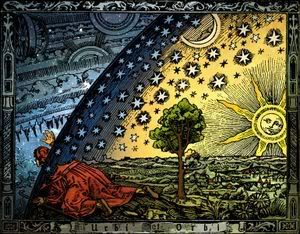
Ocassionally I'll go on Wikipedia and enlighten myself about a random topic. Since the whole Pluto demotion thing, I've been reading up more and more about the cosmos. As we all know, the universe started with a big bang. Whether you believe this was God's work or the inevitable result of a hot, super dense matzoh ball soup of matter makes no difference-- scientists have found conclusive proof that the universe is expanding in all directions away from us equally and increasing in speed. So, rewinding backwards, it makes sense that, at some point, the universe was all together in one spot.
Now, what struck me was... "the universe is expanding in all directions away from us equally." If this is true, then Earth must be the center of the universe-- right? If in fact that was the case... well, the God must have been in charge--right?
I believe in God. And coming up on Rosh Hashanah and Yom Kippur, I certainly don't want to say or do anything to upset him. But I found myself a little bit skeptical at this whole "earth is the center of the universe" conclusion I'd arrived at. It seemed to me that such a discovery, if true, would have certainly been made by now, and probably would have made news headlines on the front page right below special eyewitness reports of Suri Cruise's first shit.
So I looked up "Earth's location in the universe" on google. Every answer was "The Milky Way." Uh... duh. So I looked up "Where is the Milky Way?" "A band of light across the night sky," was the answer. Google. Master of the obvious. I did find one answer, which was that nobody knows. Helpful. So finally, I looked up "Center of the Universe." With that, I found two articles which were exceptionally enlightening.
The first was Exploratorium, a scientific website. They have an article entitled, "Where is the Center of the Universe?". "Here, There, and Everywhere" was the subtitle, and I prepared to click the back button on my browser... but instead, I read on. And my mind got ROCKED.
It turns out that every point in the universe sees itself as the center!I tried to wrap my brain around this. And I imagine, I probably would have given up thinking after a while and shouted out, "Those damn heretical hippie scientists and their crazy ideas!" But they provide a neat little toy on the bottom, where you can clearly see how it works. How did I never learn this in school?? Or maybe I did and just forgot it. NYU admitted and graduated me anyway.
Ironically, the second link provided to me by Google demonstrates the problem with people who take the bible a bit too literally.
Whereas the Exploratorium site actually made me smarter, I could feel my brain cells becoming indoctrinated with stupidity as I read Answers In Genesis:
Our galaxy—at the center of the universe after all!Now, why is it that we have to be at the center of the universe for God to exist? That doesn't make any sense to me. If we were to the left of center in the universe would it mean that God doesn't exist? It wouldn't disprove anything. The article seems to be celebrating a return to a Ptolmeic way of thinking. It completely ignores the very valid, sensical explanation found on Exploritorium's page, in favor of analysis from a guy who's biography begins with the line: "Dr Humphreys was awarded his Ph.D. in physics from Louisiana State University in 1972, by which time he was a fully convinced creationist."
Recently, new evidence has surfaced that restores man to a central place in God's universe...

Thanks to Wikipedia.. and this site, I learned the age of the universe, 14.7 billion years or so, was determined by studying background radiation and galaxies most distant from earth. Since the view is the same from every point in the universe (Thanks Exploratorium!) from the way their light appears to us (light changes colors the further away it is), we can tell how far away they are. And since the universe expanded outward from a single point, the most distant galaxies divided by the speed... ah, this is why I didn't study physics. This stuff is way confusing.
One thing I realized is, the further away science gets from earth, the more it becomes a question of faith rather than science. Same thing happens the closer we get to the smallest of objects. Beyond the sight of the furthest-reaching telescopes is a darkness we can only imagine. Beyond the magnification of the strongest microscope is a mysterious world that exists inside of all of us but is as unviewable as that most distant sky. As our technologies improve, we'll be able to see further and further, but, as even science admits, we'll never be able to see the edge.
So will we ever know where exactly in the universe we are? Maybe the better question is, "Does it matter?" Knowing our place in the cosmos is not relevant to proving God exists or that the bible's accurate or not. It's the constant search for knowledge itself that gives our lives a place, lends meaning to our endeavors, and reminds us, with each new discovery, the possibilities that exist for us in this universe are limitless.

PS. Of course, tonight I will be celebrating the 5767th birthday of the universe, despite what the scientists and their "facts and figures" say. Happy Rosh Hashanah everybody!